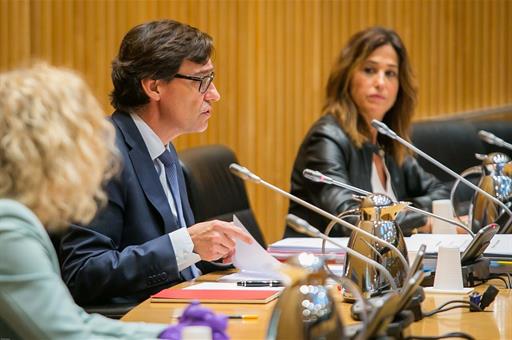Coronavirus COVID-19
"930,230 PCR diagnostic tests have been performed in Spain since the start of the crisis", says Salvador Illa
News - 2020.4.16
Between the start of the crisis and 13 April, the total number of PCR tests performed in Spain stands at 930,230.
"This testing capacity increase has been made possible by the work carried out by the Carlos III Health Institute to approve eight new research centres and universities - there are now 13 approved PCR testing centres - and the efforts made by the regional governments", said Salvador Illa. To this figure can be added the two million rapid tests already distributed throughout the country and another three million that will be delivered over the coming days.
The Minister for Health stressed that "PCR tests are a fundamental part of the diagnosis strategy, both here and in other countries" but he clarified that, "to complement them, we are using the rapid diagnosis tests that detect antibodies because that is how we can increase our diagnostic capacity".
These rapid tests allow positive cases in high prevalence groups to be identified quickly and safely, as well as to increase overall diagnosis capacity for the general public via PCR tests. In the Lower House of Parliament, Salvador Illa highlighted the work being done by the primary healthcare community during this pandemic. "They have reorganised themselves to treat minor cases at home and to actively monitor the more vulnerable by telephone, looking after their health and preventing complications that would require hospital admittance", he said.
He went on to add that "their work, besides treating minor cases, has prevented a worsening of COVID-19 and other pathologies, which has protected people's health and prevented many hospital admissions". He stressed that "this is the best level of care able to reach the entire population in an equal and preventive manner, and to more efficiently organise coordination within the public health system". This is why their work will also be important in overcoming the pandemic.
Advancements in scientific research
As regards the developments in scientific research, the minister said that "this is a matter of priority for the Government of Spain because we are painfully aware that a final victory over the virus will come through this channel". He explained that, so far, the Spanish Medication and Healthcare Products Agency (Spanish acronym: AEMPS) has authorised 32 clinical trials on medicines to treat over 26,000 people in different hospitals around the country. Furthermore, the AEMPS is taking part in the "Solidarity" clinical trial by the WHO, which will treat over 100,000 patients worldwide.
In other areas, the AEMPS has classified 42 observational studies on medicines; i.e. research in which data is gathered on patient health in order to analyse the use, safety and effectiveness of medicines in a real healthcare treatment context, in real time and without interfering with clinical practice.
In partnership with the Ministry of Science and via the Carlos III Health Institute, over 1,300 projects have been received and are being assessed for access to the COVID-19 Fund. Another four projects were approved during the course of last week, raising the total to 15 projects currently ongoing at a cost of 4.6 million euros. These projects seek to find new preventive treatments at various stages of the disease, as well as new diagnostic techniques aimed at their roll-out to cover the entire National Health System.
In his speech, Salvador Illa particularly focused on the advancements made in Spain regarding vaccines. "The National Biotechnology Centre of the National Scientific Research Council is working on two projects that are now on the list of COVID-19 vaccine candidates compiled by the World Health Organization; these two projects, which are producing some promising results in testing with animals, explore two different ways to awaken an immune response capable of protecting against the infection, which increases the likelihood of bringing one of them to clinical trials with humans", he said.
Enhancing the strengths of the Spanish National Health System
To conclude his speech, the Minister for Health reflected on the obligation to learn from this crisis and to harness the opportunity provided from those lessons learned to strengthen the National Health System in subsequent stages. He said there is a need to enhance strengths, such as coordination between levels based on the health needs of the population, to integrate people's homes into the healthcare network and to use technologies to remotely monitor patients and households.
In this same regard, he also highlighted education for public health and the need for socio-health collaboration, especially among the most vulnerable people.
Non official translation





